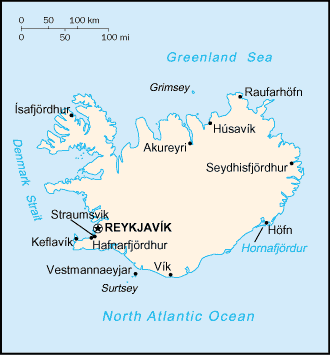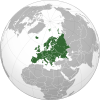Iceland
The Republic of Iceland is an island nation in the northern Atlantic Ocean, located between Greenland and Scotland, northwest of the Faroe Islands.
| |||||
| National motto: None | |||||
 | |||||
| Official language | Icelandic | ||||
| Capital | Reykjavík | ||||
| President | Ólafur Ragnar Grímsson | ||||
| Prime Minister | Davíð Oddsson | ||||
| Area - Total - % water | Ranked 104th 103,125 km² 2.7% | ||||
| Population - Total (December 31, 2003) - Density | Ranked 169th 290,570 2.82/km² | ||||
| Independence | Sovereignty December 1, 1918 Republic June 17, 1944 | ||||
| Currency | Króna (kr) | ||||
| Time zone | UTC | ||||
| National anthem | Lofsöngur | ||||
| Internet TLD | .IS | ||||
| Calling Code | 354 | ||||
History
Main article: History of Iceland
Iceland was first settled by Norwegians and Celtic (Scottish and Irish) immigrants during the late 9th and 10th century. It boasts the world's longest running parliament, the Althing (Alþingi), which was established in 930.
Iceland remained independent for over 300 years, and was subsequently ruled by Norway and Denmark, formally as a Norwegian crown colony until 1814 when the united kingdoms of Denmark and Norway were separated by the treaty of Kiel, and Iceland was kept by Denmark as a dependency. Limited home rule was granted by the Danish government in 1874, and protecterate like independence and sovereignty over domestic matters followed in 1918, foreign relations and defense remained in the authority of the Danish and the Danish king remained the sovereign of the nation until 1944, when republic was founded.
Politics
Main article: Politics of Iceland
Iceland's old parliament, the Althing, has 63 members, who are elected by the population every four years. The head of government is the prime minister, who together with his cabinet takes care of the executive part of government. The prime minister is appointed by the president, who is elected every four years, and is the head of state.
Administrative division
Municipalities
Main article: Municipalities of Iceland
There are 104 municipalities in Iceland that govern most local matters like schools, transportation and zoning.
Related topics: List of cities in Iceland
Counties
Main article: Counties of Iceland
The 23 counties are mostly a historic division. Today Iceland is split up between 26 Magistrates that are the highest authority over the local police (except in Reykjavík where there is a special office of police commissioner) and carry out administrative functions such as declaring bankruptcy and marrying people outside of the church.
District Courts
Iceland is split up into 8 district court jurisdictions.
Constituencies
Main article: Constituencies of Iceland
Until 2003, the constituencies for the parliament elections were the same as the district court jurisdictions but by an amendment to the constitution they were changed so that today there are only 6 constituencies. The change was made in order to balance the weight of different districts of the country since a vote cast in the sparsely populated areas around the country would count much more than a vote cast in the Reykjavík city area, the imbalance between districts has been reduced by the new system but it still exists.

Geography
Main article: Geography of Iceland & List of cities in Iceland
Iceland is located on a geological hot spot on the Mid-Atlantic Ridge. It has many active volcanoes, notably the Hekla, and around 10% of the island is glaciated. Iceland has many geysers (itself an Icelandic word) and the widespread availability of geothermal power means residents of most towns have hot water and home heat for a low price. (See also: Volcanoes of Iceland) Electricity is generally very cheap because of the many rivers and waterfalls which are also be used for the generation of electrical power. (See also: Rivers of Iceland, Waterfalls of Iceland, Lakes of Iceland)
The island itself has many fjords along the coastline, where also most cities are situated, because the island's interior, the Highlands of Iceland are an uninhabitable desert. The main towns are the capital Reykjavík, Keflavík, where the national airport is situated, and Akureyri. The island of Grímsey, on the Arctic Circle contains the northernmost habitation of Iceland. (See also: Fjords of Iceland)
Unlike neighbouring Greenland, Iceland is considered to be a part of Europe, not of America. The island is the world's 18th largest island.
The island has four national parks: Jökulsárgljúfur National Park, Skaftafell National Park, Snæfellsnes National Park and Þingvellir.
Economy
Main article: Economy of Iceland
The economy depends heavily on the fishing industry, which provides over 60% of export earnings and employs 8% of the work force. In the absence of other natural resources (except for abundant hydro-electric and geothermal power), Iceland's economy is vulnerable to changing world fish prices. The economy remains sensitive to declining fish stocks as well as to drops in world prices for its main exports: fish and fish products, aluminum, and ferrosilicon.
The only natural resource conversion is the manufacture of cement. Most buildings are concrete with expensive imported wood used only sparingly and where necessary.
The center-right government plans to continue its policies of reducing the budget and current account deficits, limiting foreign borrowing, containing inflation, revising agricultural and fishing policies, diversifying the economy, and privatizing state-owned industries. The government remains opposed to EU membership, primarily because of Icelanders' concern about losing control over their fishing resources.
Iceland's economy has been diversifying into manufacturing and service industries in the last decade, and new developments in software production, biotechnology, and financial services are taking place. The tourism sector is also expanding, with the recent trends in ecotourism and whale-watching. Growth has slowed between 2000 and 2002, but is expected to pick up in 2003.
Demographics
Main article: Demographics of Iceland
The isolated location of Iceland has resulted in limited immigration and limited genetic inflow in its human population over hundreds of years. The resulting genetic similarity is being exploited today for genetic studies.
The language spoken is Icelandic, a Scandinavian language, and the religion is predominantly Lutheran.
Culture
Main article: Culture of Iceland
Some famous Icelanders include pop singer Björk, avant-garde rock band Sigur Ros and novelist Halldór Laxness, winner of the Nobel Prize for literature in 1955.
See also: Music of Iceland, List of Icelandic authors, Artists of Iceland
Miscellaneous topics
- List of Icelanders
- Communications in Iceland
- Geothermal power in Iceland
- Transportation in Iceland
- Military of Iceland
- Foreign relations of Iceland
- Stamps and postal history of Iceland
- Naming conventions of Iceland
- List of universities in Iceland
- Þjóðernishyggja
External links
- Picture gallery from www.islandsmyndir.is
- Offical gateway to Iceland and the Icelandic Foreign Service.
- Information about Alþingi (Parliament)
- The Trade Council of Iceland
- Worldwide press freedom index rank 1 out of 139 countries (4 way tie)
- Physics Department of Icelandic Meteological Office (includes earthquake list_ (in English and Icelandic)
- Travel information from the Public Roads Administration (in English and Icelandic)
- Volcanoes in Iceland
- Air quality in Iceland
- University of Iceland (Reykjavik)


